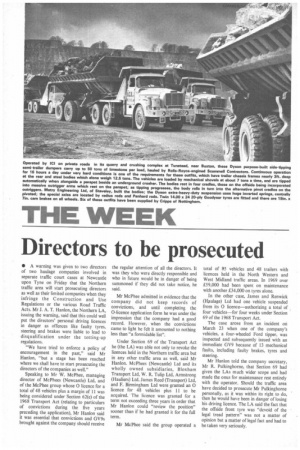Directors to be prosecuted
Page 18

If you've noticed an error in this article please click here to report it so we can fix it.
• A warning was given to two directors of two haulage companies involved in separate traffic court cases at Newcastle upon Tyne on Friday that the Northern traffic area will start prosecuting directors as well as their limited companies when they infringe the Construction and Use Regulations or the various Road Traffic Acts. Mr J. A. T. Hanlon, the Northern LA, issuing the warning, said that this could well put the directors' personal driving licences in danger as offences like faulty tyres, steering and brakes were liable to lead to disqualification under the totting-up regulations.
"We have tried to enforce a policy of encouragement in the past," said Mr Hanlon, "but a stage has been reached where we shall have to start prosecuting the directors of the companies as well."
Speaking to Mr W. McPhee, managing director of McPhees (Newcastle) Ltd, and of the McPhee group whose 0 licence for a total of 48 vehicles plus a margin of 11 was being considered under Section 62(e) of the 1968 Transport Act (relating to particulars of convictions during the five years preceding the application), Mr Hanlon said it was essential that convictions and GV9s brought against the company should receive the regular attention of all the directors. It was they who were directly responsible and who in future would be in danger of being summoned if they did not take notice, he said.
Mr McPhee admitted in evidence that the company did not keep records of convictions, and until completing the 0-licence application form he was under the impression that the company had a good record. However, when the convictions came to light he felt it amounted to nothing less than "a formidable list".
Under Section 69 of the Transport Act he (the LA) was able not only to revoke the lioences held in the Northern traffic area but in any other traffic area as well, said Mr Hanlon. McPhees (Newcastle) Ltd and its wholly owned subsidiaries, 13Ioxham Transport Ltd, W. R. Tulip Ltd, Armstrong (Hauliers) Ltd, James Reed (Transport) Ltd, and F. Birmingham Ltd were granted an 0 licence for 48 vehicles plus 11 to be acquired. • The licence was granted for a term not exceeding three years in order that Mr Hanlon could "review the position" sooner than if he had granted it for the full term.
Mr McPhee said the group operated a total of ff5 vehicles and 48 trailers with licences held in the North Western and West Midland traffic areas. In 1969 over £59,000 had been spent on maintenance with another £34,000 on tyres alone.
In the other case, James and Renwick (Haulage) Ltd had one vehicle suspended from its 0 licence—authorizing a total of four vehicles—for four weeks under Section 69 of the 1968 Transport Act.
The case arose from an incident on March 23 when one of the company's vehicles, a four-wheeled Ford tipper, was inspected and subsequently issued with an immediate GV9 because of 13 mechanical faults, including faulty brakes. tyres and steering.
Mr Hanlon told the company secretary. Mr R. Pulkinghorne, that Section 69 had given the LAs much wider scope and had made the onus for maintenance rest entirely with the operator. Should the traffic area have decided to prosecute Mr Pulkinghorne personally, as it was within its right to do, then he would have been in danger of losing his driving licence. The LA said the fact that the offside front tyre was "devoid of the legal tread pattern" was not a matter of opinion but a matter of legal fact and had to be taken very seriously.












































































































